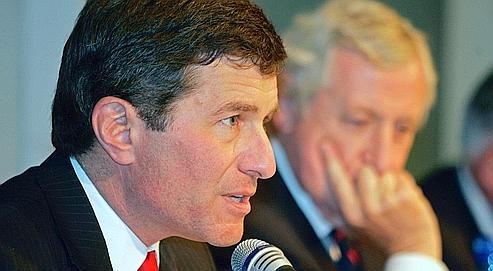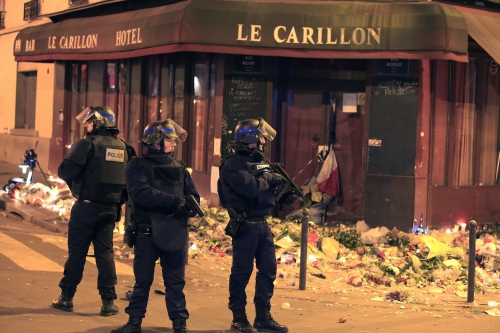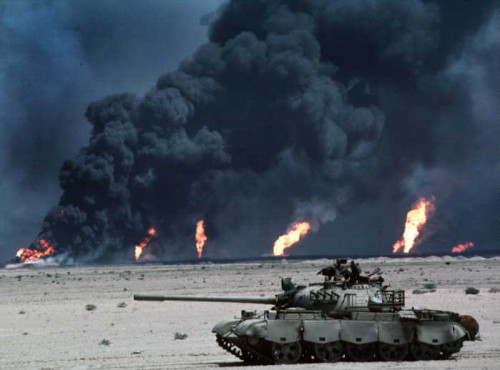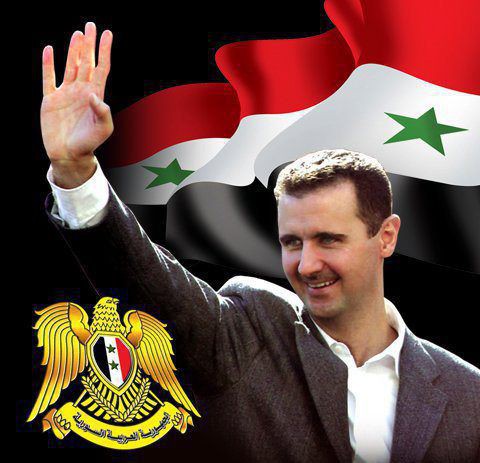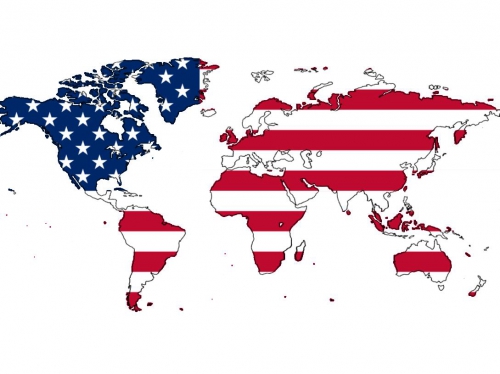De la mauvaise stratégie des Etats-Unis
Entretien avec le Prof. Dr. Peter Scholl-Latour
Propos recueillis par Moritz Schwarz
Né en 1924 à Bochum dans la Ruhr, Peter Scholl-Latour travaille depuis 1950 comme journaliste international. De 1954 à 1955, il a été le porte-paroles du nouveau gouvernement de Sarre, après que celle-ci soit retournée dans le giron de la RFA. Orientaliste de formation, il a entrepris des voyages d'étude dans toutes les parties du monde. De 1960 à 1963, il a été le correspondant en Afrique de l'ARD, puis a dirigé à Paris les studios de cette station de radio-télévision. En 1969, il est devenu le directeur de la WDR puis, en 1971, le chef du département des correspondants à l'étranger de la ZDF. A partir de 1975, il devient le chef du studio parisien de celle-ci. De 1983 à 1988, il occupe le poste d'éditeur de l'hebdomadaire Stern (Hambourg), puis en devient le rédacteur en chef et un des administrateurs du groupe de presse Gruner & Jahr. Il a écrit de très nombreux livres de voyage sur les pays du Proche- et du Moyen-Orient, qu'il a visités de fond en comble. Cet acquis fait de lui l'un des meilleurs experts allemands de cette région en ébullition, qui n'est boudé par aucun médium. En décembre 2002, il a fait paraître chez Propyläen un livre critique à l'égard de la politique brutale des Etats-Unis dans la région, Kampf dem Terror - Kampf dem Islam? Chronik eines unbegrenzten Krieges [= La lutte contre le terrorisme est-elle une lutte contre l'Islam? Chronique d'une guerre sans fin]. Comme le titre l'indique clairement: la guerre que Bush entend entamer en Irak ne connaîtra pas de fin et constitue dès lors une entreprise déraisonnable, à laquelle l'Europe ne doit pas participer.
MS: Professeur Scholl-Latour, immédiatement après la date du 27 janvier, jour où les inspecteurs de l'ONU auront remis leur rapport sur l'Irak, on pourra compter sur une attaque américaine contre ce pays arabe, car le déploiement des troupes bat désormais son plein. Vous avez voyagé pendant des années dans cette région, vous l'avez traversée de long en large, vous avez rédigé quantité d'articles et de livres sur le Proche- et le Moyen-Orient. Pensez-vous qu'une attaque "ponctuelle" aura lieu après le 27 janvier ou pensez-vous que les médias répandent de la désinformation quant au moment de l'attaque et que celle-ci se déclenchera plus tôt, avant qu'une protestation universelle ne s'orchestre contre cette guerre?
PSL: On peut penser, en effet, que les Etats-Unis commenceront par soumettre l'Irak à des bombardements intensifs avant la fin du mois de janvier. Dans la foulée, ils déclencheront ensuite une attaque sur le terrain, dès que leur déploiement aura été parachevé. Les Américains ne tiendront guère compte des résultats de l'inspection de l'ONU, si ceux-ci ne cadrent pas avec leur agenda.
MS: Déjà lors de la première guerre du Golfe en 1991, les Etats-Unis ont lancé un bobard propagandiste, affirmant que des nourrissons koweitiens avaient été tués par des soldats irakiens, afin de manipuler l'opinion publique américaine et internationale, pour qu'elle abonde dans le sens de la guerre. L'année dernière, les Américains ont annoncé leur intention —retirée depuis— de créer un ministère de la propagande et de la désinformation. Personne, à l'heure actuelle, ne pense sérieusement que l'escalade sera provoquée par l'Irak, pourtant, aucun homme politique occidental en vue n'ose remettre en question le fondement même de cette propagande américaine, qui prétend que l'attaque dépendra du comportement de Saddam Hussein; au contraire, on entend les hommes politiques européens discuter avec un "sérieux papal" des légendes répandues par la propagande américaine…
PSL: Le bon vieux truc de la provocation entièrement machinée ne date pas d'hier. Déjà, la guerre du Vietnam avait commencé à la suite d'une présentation fallacieuse, dans les médias américains, d'un incident survenu dans le Golfe du Tonkin en 1964, où, soi-disant, de petits patrouilleurs nord-vietnamiens auraient attaqué la flotte américaine. Ce qui est exact, c'est que des navires de guerre américains avaient pénétré dans les eaux territoriales nord-vietnamiennes, comme l'attestent les documents mêmes du Pentagone, qui ont été publiés depuis. Le fait que nos politiciens acceptent pour argent comptant la propagande intensive des Etats-Unis prouve que nous nous trouvons dans un état de subordination totale à l'égard de Washington.
MS: Comment expliquez-vous alors le fait que les politiciens européens et surtout les médias en place reprennent, sans la contester ni même la soumettre à une critique sommaire, la thèse que la guerre ou la paix ne dépendent que du seul Saddam Hussein, alors que le dictateur irakien doit à tout prix éviter un conflit ouvert, uniquement parce que son premier intérêt est simplement de survivre?
PSL : La liberté de la presse, dans l'aire capitaliste, n'est pas illimitée. Et, par conséquent, induire systématiquement en erreur l'opinion publique occidentale constitue une négation patente des principes mêmes de la "communauté occidentale des valeurs". Nous sommes entrés dans une époque sans merci, très rude. La présidence américaine actuelle manie une vision du monde manichéenne, qui ne connaît qu'un Bien absolu, opposé à un Mal absolu. Malheureusement, la morale et la politique ne se concilient que très rarement. Comme Nietzsche le disait: «L'Etat est le plus froid des monstres froids».
MS: Contrairement à ce qui s'est passé en 1991, Saddam Hussein cherchera vraisemblablement à éviter une bataille frontale ouverte et tentera d'attirer les Américains dans une guerre de partisans et dans des combats de rue, types de combat que même une grande puissance ne peut gagner, comme on le voit aujourd'hui en Tchétchénie.
PSL: A la condition toutefois qu'une partie des soldats irakiens soit prête à se battre jusqu'au dernier homme. Si on en arrive à de tels combats de partisans et de rue, les troupes américaines auront fort à faire, car Bagdad est une ville difficilement contrôlable, abritant six millions d'habitants. Les Irakiens utiliseront sans doute des gaz de combat. Mais, on peut penser aussi que, face à la pression des troupes américaines, entrant dans le pays, le régime s'écroule et se liquéfie. En 1991, dès le début de l'offensive américaine sur le terrain, l'ordre étatique s'est effondré dans le Sud du pays, et même à Bagdad, où, venus des quartiers pauvres, des hordes de pillards se sont jetés sur le centre de la ville. Dès que la nouvelle s'est diffusée que Saddam Hussein avait conclu un armistice avec les Américains, l'ordre a été rétabli très vite et très brutalement. Autre possibilité: pendant la progression éventuelle des troupes américaines, nous pourrions assister à un putsch d'officiers, qui se diront: «Saddam doit partir, sinon nous nous balancerons à ses côtés au bout d'un gibet». Saddam Hussein suscite la haine dans de nombreuses catégories de la population. De nombreux habitants de Bagdad seraient capables d'accueillir les troupes américaines dans la liesse. Cependant, une chose est sûre: une telle liesse, si elle a lieu, ne durera pas longtemps. Toute occupation étrangère de l'Irak, par des troupes non musulmanes, conduira, immanquablement, à une révolte populaire. Même les adversaires actuels de Saddam Hussein, comme les nationalistes panarabes et surtout les activistes islamistes, pourront en fin de compte déclencher une guerre d'usure, une "guerre asymétrique", que les Etats-Unis ne pourront subir pendant longtemps, rien que pour des motifs psychologiques.
MS: Vous aviez prédit l'attaque prochaine contre l'Irak dès les événements du 11 septembre 2001. Pourquoi? Parce que les Etats-Unis sont dorénavant bien décidés, depuis cette journée tragique, à liquider toute menace potentielle sans tenir compte du droit international?
PSL: Non. Le projet d'attaquer l'Irak une seconde fois, les Américains le cultivaient déjà sous la présidence de Clinton, donc bien avant le 11 septembre 2001. Mais, à l'époque, ce projet n'apparaissait pas comme opportun pour des raisons de politique étrangère. Aujourd'hui, cependant, dans le cadre de ce qu'ils appellent la "guerre contre le terrorisme", les Américains ont déclenché une action punitive globale, qui touche aussi l'Irak, décrit comme "Etat voyou", afin d'avoir un prétexte pour l'éliminer. Alors que même la CIA a admis que jamais l'Irak n'avait participé aux actions terroristes internationales.
MS: Pourtant les Etats-Unis avancent des arguments très plausibles, par exemple, quand ils disent que l'Irak prépare et stocke des armes de destruction massive, participe à la prolifération des armements, etc. Le rôle des Etats-Unis serait dès lors de mettre un terme à cette prolifération dangereuse.
PSL: Le fait est que toute prolifération constitue un danger apocalyptique pour l'avenir de l'humanité —les Européens doivent le savoir eux aussi. Cependant, choisir l'Irak pour cible en ce domaine est inepte. Si l'on suit l'argumentation de Bush, alors il faudrait d'abord neutraliser la Corée du Nord, qui vient d'admettre qu'elle possède ses armes atomiques propres. Pour empêcher l'Irak de construire des armes nucléaires dans l'avenir, il suffit de perpétuer les contrôles de l'ONU. Certes, on peut construire des armes chimiques et biologiques dans n'importe quelle cave, mais on ne peut pas construire des bombes atomiques avec des installations rudimentaires qui peuvent passer inaperçues.
MS: Les armes nucléaires restent donc un danger…
PSL: Il est très facile de fabriquer des armes chimiques, chaque pays de la région proche- et moyen-orientale en a les capacités. En réalité, la question est bien plus fondamentale: il faudrait qu'à Washington, les décideurs comprennent la mentalité de leurs adversaires potentiels. Par exemple, les Américains menacent l'Iran d'une frappe nucléaire préventive. De ce fait, il me paraît évident que tout homme d'Etat iranien, digne de ce nom, cherchera par tous les moyens à se doter d'armements nucléaires, pour se protéger contre la pression et le chantage qu'exerce sur lui la super-puissance américaine, comme le fait d'ores et déjà la Corée du Nord, ou le Pakistan contre l'Inde, qui lui est supérieure sur le plan militaire.
MS: Que pensez-vous de la motivation qu'avancent les Etats-Unis pour attaquer l'Irak? S'agit-il en fait seulement du pétrole, comme on aime à le dire?
PSL: Ma réponse vous apparaître d'une extrême banalité, vous pourrez la qualifier de "populiste" ou de "démagogique", mais, de fait, la motivation centrale reste la même qu'en 1991. Les Américains veulent surtout imposer un ordre nouveau, une pax americana, au Proche-Orient, dont Israël aussi serait le bénéficiaire.
MS: Saddam n'est pourtant que le moindre mal, même pour les Américains, car il est isolé, il est hostile aux islamistes et largement désarmé. Ce sont trois avantages pour les Américains et ils semblent les négliger, car ils disparaîtront en cas de chute de l'actuelle dictature irakienne; l'avenir sera alors incertain, nous aurons plutôt la guerre civile et l'avènement d'un fondamentalisme islamiste en Irak, et non pas la paix et la liberté…
PSL: C'est exact. C'est pourquoi la stratégie américaine me semble erronée. Car pour maintenir la cohésion territoriale de l'Irak après Saddam Hussein, le Pentagone devra immanquablement recourir à une nouvelle dictature à Bagdad, qui serait semblable à celle qu'exerce Saddam Hussein, à la seule différence qu'elle autoriserait les Etats-Unis à puiser dans les nappes pétrolifères irakiennes. Mais je pense qu'un autre élément entre en jeu: il est fort possible que les Etats-Unis ont encore un compte à régler avec Saddam Hussein. Je pense que Georges Bush Senior, il y a douze ans, a mis abruptement un terme à l'offensive sur le terrain, parce qu'on lui avait annoncé que Saddam Hussein était sur le point d'être éliminé par un putsch militaire. Sans doute est-ce Saddam Hussein lui-même qui lui a transmis l'information. Ensuite, autre facteur: l'avenir de l'Arabie Saoudite, officiellement alliée des Etats-Unis, mais où se situe sans nul doute le noyau dur de la conspiration d'Al Qaïda. Si jamais les fournitures en pétrole d'Arabie Saoudite venaient à s'interrompre, pour quelque motif que ce soit, les Etats-Unis auraient besoin du pétrole irakien pour compenser par des proportions identiques.
MS: Du fait que l'objectif ultime de cette guerre américaine apparaît comme peu rationnel, peut-on dire que les analyses de certains "dissidents" américains comme Immanuel Wallerstein ou Chalmers Johnson sont exactes? Qu'il s'agit tout simplement d'imposer un "imperium" américain?
PSL: Leur vue correspond à ce que disait l'ancienne ministre américaine des affaires étrangères, Madeleine Albright, quand elle évoquait la "nation indispensable" que devaient devenir les Etats-Unis.
MS: Donc, in ultima ratio, la guerre contre l'Irak n'est pas une guerre destinée à empêcher la prolifération d'armes de destruction massive, mais constituera la première frappe d'une guerre de longue durée pour soumettre le Proche- et le Moyen-Orient à la volonté des Etats-Unis?
PSL: La "guerre contre le terrorisme", que nous a annoncée le Président Bush junior, va durer de longues années, en effet. Et cette guerre ne connaîtra aucune limitation d'ordre géographique, comme on peut le déduire déjà, à l'évidence. Selon des données que laisse filtrer la CIA, soixante Etats (!) dans le monde sont considérés aujourd'hui comme "peu sûrs" par les Etats-Unis. C'est inquiétant, mais nous ne devons pas nous laisser entraîner dans les travers d'un anti-impérialisme simpliste. Les Etats-Unis avancent une idée évidente: les "imperia" peuvent s'avérer nécessaires pour générer de l'ordre dans le monde. Cependant, je ne pense pas que les Etats-Unis soient habilités à jouer ce rôle, car j'ai constaté, au cours de toute ma carrière, qu'ils ne possèdent pas cet indispensable instinct qui a permis, à d'autres, de comprendre la réalité des autres cultures. Quant à la posture que prend l'Europe aujourd'hui, elle risque bien de devenir absolument intenable, car son incapacité politique et militaire la condamne à devenir totalement dépendante des Etats-Unis. Ne comprenez pas mon affirmation de travers: l'alliance atlantique demeurera indispensable à l'Europe et aux Etats-Unis, dans l'avenir. Mais l'organisation qui structure cette alliance et qui a fait ses preuves au cours de la guerre froide, c'est-à-dire l'OTAN, bétonne aujourd'hui la domination hégémonique sans faille du haut commandement américain sur les forces armées européennes. Prenons un exemple: si un conflit éclate entre les Etats-Unis et la Chine, l'Allemagne devra-t-elle envoyer ses soldats combattre l'armée de libération populaire chinoise, dans le cadre de la "Nato-Response-Force"? Lorsque j'entends un ministre allemand de la défense dire que la sécurité de l'Allemagne se défend sur l'Hindou Kouch, je me demande si nos hommes politiques sont encore sains d'esprit! Les chances de voir advenir une défense européenne autonome sont aujourd'hui pure illusion. Quel homme d'Etat et quel parti seraient prêts aujourd'hui en Allemagne à faire construire pour le pays des porte-avions, des sous-marins atomiques ou des fusées nucléaires à l'instar de la France? Au moins, si les Allemands ne sont pas chauds pour agir dans un cadre européen, ils devraient au moins, un jour, se décider à agir dans un cadre national, pour se protéger contre tout chantage atomique venu de l'extérieur.
MS: Le terrorisme vise à ce que les Occidentaux, surtout les Américains, se retirent des hémisphères qui leur sont étrangers et compte sur la vulnérabilité des grosses structures. La création d'un "imperium", dans cette optique, avec ou sans l'Europe, ne constitue-t-elle pas une réponse erronée?
PSL: Tel est effectivement le problème, car le terrorisme est l'arme des faibles. Pour l'Occident, il existe aujourd'hui deux dangers réels, notamment la prolifération des armes de destruction massive et la menace démographique. Telles sont les deux conditions, aux effets potentiellement funestes, qui alimenteront le terrorisme de demain. Quant à la volonté américaine de construire un "imperium", elle doit se déduire des événements du 11 septembre 2001. Il ne s'agit pas tant d'une mutation dans le fameux "choc des civilisations", comme on le prétend généralement. La signification du "Ground Zero" à New York réside en ceci: la psychologie des Américains a désormais changé. Et de fonds en comble!
MS: Que reste-t-il alors de cette idée sublime, qui nous évoque un "ordre juste" pour le monde entier?
PSL: Un ordre mondial juste a-t-il déjà existé dans l'histoire?
MS: Et qu'en est-il du droit des gens, du droit international?
PSL: Ne nous faisons pas d'illusions: le droit des gens a toujours été un bricolage tissé de bonnes intentions. Quand quelqu'un me sort des grands mots comme "family of Nations" ou "communauté internationale des peuples libres", alors il ne me prouve qu'une chose: qu'il ment.
MS: Le Chancelier fédéral Schröder en parle pourtant…
PSL: Je considère que Gerhard Schröder est un virtuose de l'arrangement, mais aussi un homme sans conscience historique et sans "feeling" pour la politique internationale. Or cette absence de "feeling" pour la marche du monde est symptomatique en Allemagne: lorsque je regarde l'émission "ARD-Presseclub", qui est censée s'occuper de problèmes politiques importants, je constate qu'on n'y cause que de thèmes intérieurs, de retraites, de tarifs, d'impôts, alors qu'en dehors de nos frontières, le monde est littéralement en train de s'effondrer. Je reste cependant certain que dans quelques années nos hommes politiques, à leur tour, devront enfin se consacrer à des problèmes qui mettent réellement nos existences en jeu.
(entretien paru dans Junge Freiheit, n°3/2003; http://www.jungefreiheit.de ).
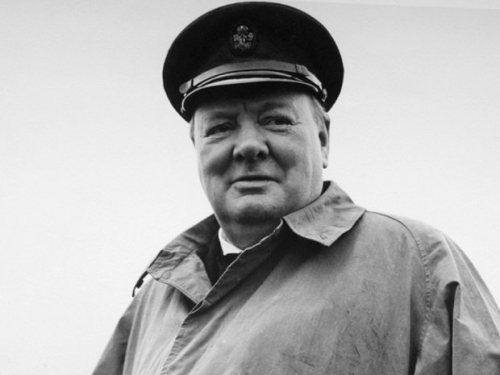
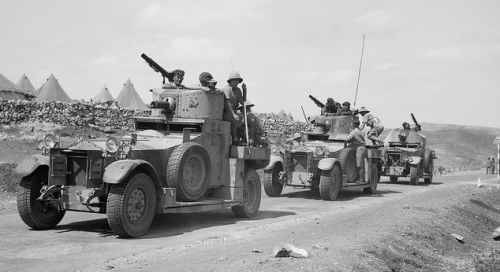
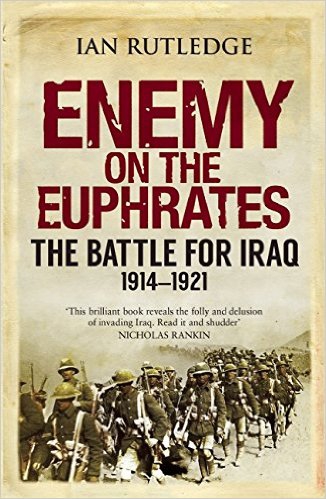 The Iraqi nation grew increasingly wealthy, as oil revenues rose from $500 million in 1972 to over $26 billion in 1980, an increase of almost 50 times in nominal terms.
The Iraqi nation grew increasingly wealthy, as oil revenues rose from $500 million in 1972 to over $26 billion in 1980, an increase of almost 50 times in nominal terms.




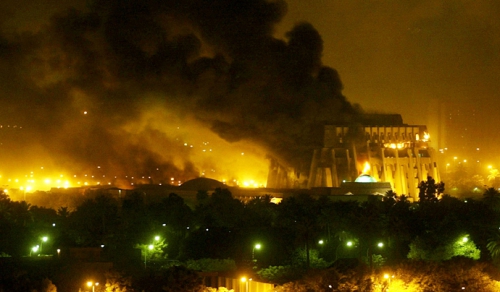
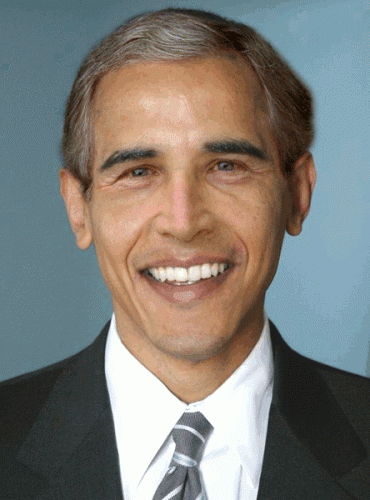 Die Lobrede des Friedensnobelpreisträgers und US-Präsidenten Barak Obama auf Krieg und Besatzung im neokolonialsierten Irak anlässlich des amerikanischen Truppenabzuges demaskierte den „Hoffnungsträger“ vieler Gutmenschen als wohl verdienten Nachfolger von George Bush. Obamas Kriegsrede vor mehreren tausend US-Soldaten in Fort Bragg war na Zynismus nur sehr schwer zu überbieten. Der Truppenabzug der US-Besatzer aus dem Irak sei ein Ergebnis seiner Regierungspolitik, so Obama. In Warhrheit hat der Truppenabzug aber rein gar nichts mit der Politik der US-Administration unter Obama zu tun, sondern ist das Ergebnis des jahrelangen Widerstandes nationaler Irakis gegen das Besatzungsregime in Washington und der Unfähigkeit der US-Administration ein neues Stationierungsabkommen auszuhandeln. Die irakische Regierung, und überhaupt alle wichtigen politischen Kräfte im Irak, weigerten sich, Washingtons Forderung nach allgemeiner Immunität vor irakischen Gerichten für amerikanische Truppen nachzugeben.
Die Lobrede des Friedensnobelpreisträgers und US-Präsidenten Barak Obama auf Krieg und Besatzung im neokolonialsierten Irak anlässlich des amerikanischen Truppenabzuges demaskierte den „Hoffnungsträger“ vieler Gutmenschen als wohl verdienten Nachfolger von George Bush. Obamas Kriegsrede vor mehreren tausend US-Soldaten in Fort Bragg war na Zynismus nur sehr schwer zu überbieten. Der Truppenabzug der US-Besatzer aus dem Irak sei ein Ergebnis seiner Regierungspolitik, so Obama. In Warhrheit hat der Truppenabzug aber rein gar nichts mit der Politik der US-Administration unter Obama zu tun, sondern ist das Ergebnis des jahrelangen Widerstandes nationaler Irakis gegen das Besatzungsregime in Washington und der Unfähigkeit der US-Administration ein neues Stationierungsabkommen auszuhandeln. Die irakische Regierung, und überhaupt alle wichtigen politischen Kräfte im Irak, weigerten sich, Washingtons Forderung nach allgemeiner Immunität vor irakischen Gerichten für amerikanische Truppen nachzugeben. 